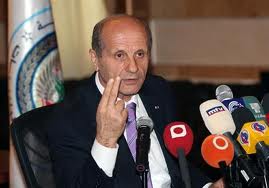 Lebanon Interior Minister Marwan Charbel told Kuwaiti newspaper Al-Anbaain remarks published on Tuesday that ending the Sidon sit-in held by Sheikh Ahmad Assir, was beyond his capacity and that of the cabinet and the society.
Lebanon Interior Minister Marwan Charbel told Kuwaiti newspaper Al-Anbaain remarks published on Tuesday that ending the Sidon sit-in held by Sheikh Ahmad Assir, was beyond his capacity and that of the cabinet and the society.
“Removing the sit-in in Sidon requires a political cover that is more difficult to provide than what was needed for resolving clashes in Tripoli or for opening the airport road,” Charbel said .
Charbel urged the political and military forces to “bear their responsibilities and stop blaming the Ministry of Interior.
The stated goal of the sit-in by Assir, the charismatic 44-year-old Salafist cleric is to bring the Shiite militant group Hezbollah’s vast, independent arsenal of weapons under the control of the government.
The sit-in, is raising concern among the Lebanese that the country’s fragile sectarian balance is unraveling – an alarming prospect in a country which has yet to fully recover from a bloody, 15-year civil war.
Hezbollah, which was credited with liberating Lebanese territories from Israel in 2000 was a very popular organization in Lebanon and throughout the Arab world. But according to analysts ever since its 2006 war with Israel, Hezbollah has become the main liability for Lebanon. In 2006 Hezbollah’s arms were used to try and bring down the government of former PM Fouad Siniora. In 2008 Hezbollah pointed its guns against the Lebanese people when it occupied more than half of Beirut and tried but failed to occupy Mt Lebanon . In 2011 it brought down the government of former PM Saad Hariri and reportedly used its arms to force progressive socialist party leader MP Walid Jumblatt and his parliamentary bloc to vote for their candidate Nagib Mikati as the new premier . Hezbollah’s continued use of its arms internally to intimidate the Lebanese and its current support for the Syrian and Iranian regimes are major concerns for the Lebanese people, analysts say. Analysts also blame Hezbollah’s extremism for the emergence of the Salafists in Lebanon who are considered Sunni extremists.

Leave a Reply
You must be logged in to post a comment.